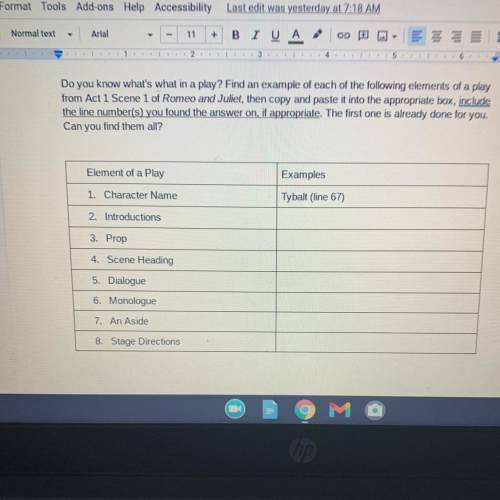
English, 25.02.2021 22:10 makenziehook8
Do you know what's what in a play? Find an example of each of the following elements of a play
from Act 1 Scene 1 of Romeo and Juliet, then copy and paste it into the appropriate box, include
the line number(s) you found the answer on, if appropriate. The first one is already done for you.
Can you find them all?
Element of a Play
Examples
1. Character Name
Tybalt (line 67)
2. Introductions
3. Prop
4. Scene Heading
5. Dialogue
6. Monologue
7. An Aside
8. Stage Directions


Answers: 2


Another question on English

English, 21.06.2019 15:30
How does the narrator’s knowledge of his postapocalyptic world in "by the waters of babylon” affect his reactions to the different settings? it motivates him to make up stories about the world and the places he explores. it has caused him to fear the settings outside the hill country, so he tries to avoid them. it forces him to reject what he sees and experiences himself at various locations in the story. it makes him cautious about new settings yet open-minded and critical of what he experiences.
Answers: 1

English, 22.06.2019 00:30
The tone of a story is the author's attitude toward the subject. provide two examples that support the conclusion that the tone of this story is ironic.
Answers: 3

English, 22.06.2019 02:00
21) this excerpt involves david, who travels with an inventor named perry. they test their experimental invention, a vehicle that burrows into the earth's crust. which statement best reflects the human experience that is represented in this excerpt? a) humans are not always reliable guides. b) humans desire wealth and a life of ease. c) humans are drawn to explore and experiment. d) humans attempt to conquer and control nature. 22) which statement best reflects the human experience that is represented in this excerpt? a) humans desire to control nature. b) humans are frightened by nature. c) humans are fascinated by nature. d) humans cannot understand nature. 23) 8 “what do you mean perry? ” i cried. “do you think that we are dead, and this is heaven? ” suppose the author changed section eight as listed below. 8 “perry, i have to object! ” i cried. “you don't think that we are dead, and this is heaven, do you? ” which correctly identifies the author's meaning for the word object? consider the effect of the stressed or unstressed syllable in the word object. a) you would stress the second syllable because the word is a noun and means a goal or purpose. b) you would stress the second syllable because the word is a verb and means to express or feel disapproval. c) you would stress the first and second syllable because the word is a verb and means to modify an adjective. d) you would stress the first syllable because the word is a noun and means a thing that has a finite, physical form. 24) 2 together we stepped out to stand in silent contemplation of a landscape at once weird and beautiful. before us a low and level shore stretched down to a silent sea. as far as the eye could reach the surface of the water was dotted with countless tiny isles—some of towering, barren, granitic rock—others resplendent in gorgeous trappings of tropical vegetation, myriad starred with the magnificent splendor of vivid blooms. 3 behind us rose a dark and forbidding wood of giant arborescent ferns intermingled with the commoner types of a primeval tropical forest. huge creepers depended in great loops from tree to tree, dense under-brush overgrew a tangled mass of fallen trunks and branches. upon the outer verge we could see the same splendid coloring of countless blossoms that glorified the islands, but within the dense shadows all seemed dark and gloomy as the grave. which most completely analyzes this excerpt for a comment about life? a) beauty is kind and inviting. b) nature is evil and forbidding. c) there is no risk in following beauty. d) what appears beautiful can also be deadly.
Answers: 1

English, 22.06.2019 08:30
Which pair of uses of figurative language from “the caged bird” support the extended metaphor of freedom versus oppression? back of the wind; floats downstream his wings are clipped; his feet are tied the caged bird sings; the free bird thinks dawn bright lawn; grave of dreams
Answers: 1
You know the right answer?
Do you know what's what in a play? Find an example of each of the following elements of a play
from...
Questions

English, 25.02.2021 07:40



Mathematics, 25.02.2021 07:40

Social Studies, 25.02.2021 07:40

Physics, 25.02.2021 07:40

Business, 25.02.2021 07:40



English, 25.02.2021 07:40

Mathematics, 25.02.2021 07:40


English, 25.02.2021 07:40

Mathematics, 25.02.2021 07:40

Mathematics, 25.02.2021 07:40

Mathematics, 25.02.2021 07:40



Mathematics, 25.02.2021 07:40



